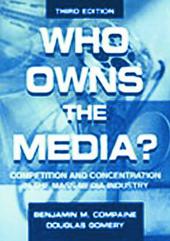
|
Who Owns the Media?: Competition and Concentration in the Mass Media Industry
Paperback
Main Details
| Title |
Who Owns the Media?: Competition and Concentration in the Mass Media Industry
|
| Authors and Contributors |
By (author) Benjamin M. Compaine
|
|
By (author) Douglas Gomery
|
| Series | Routledge Communication Series |
|---|
| Physical Properties |
| Format:Paperback | | Pages:632 | | Dimensions(mm): Height 254,Width 178 |
|
| Category/Genre | Ownership and organization of enterprises |
|---|
| ISBN/Barcode |
9780805829365
|
| Classifications | Dewey:338.4730223 |
|---|
| Audience | | Undergraduate | | Postgraduate, Research & Scholarly | | Professional & Vocational | |
|---|
| Edition |
3rd Revised edition
|
| Illustrations |
black & white illustrations
|
|
Publishing Details |
| Publisher |
Taylor & Francis Inc
|
| Imprint |
Routledge Member of the Taylor and Francis Group
|
| Publication Date |
13 July 2000 |
| Publication Country |
United States
|
Description
This thorough update to Benjamin Compaine's original 1979 benchmark and 1982 revisit of media ownership tackles the question of media ownership, providing a detailed examination of the current state of the media industry. Retaining the wealth of data of the earlier volumes, Compaine and his co-author Douglas Gomery chronicle the myriad changes in the media industry and the factors contributing to these changes. They also examine how the media industry is being reshaped by technological forces in all segments, as well as by social and cultural reactions to these forces. This third edition of Who Owns the Media? has been reorganized and expanded, reflecting the evolution of the media industry structure. Looking beyond conventional wisdom and expectations, Compaine and Gomery examine the characteristics of competition in the media marketplace, present alternative positions on the meanings of concentration, and ultimately urge readers to draw their own conclusions on an issue that is neither black nor white. Appropriate for media practitioners and sociologists, historians, and economists studying mass media, this volume can also be used for advanced courses in broadcasting, journalism, mass communication, telecommunications, and media education. As a new benchmark for the current state of media ownership, it is invaluable to anyone needing to understand who controls the media and thus the information and entertainment messages received by media consumers.
|